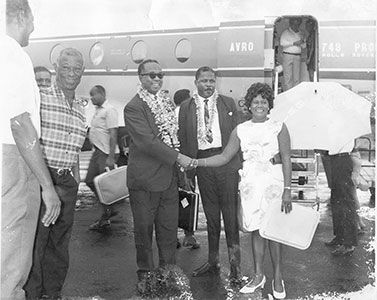Entrepreneurs of St Vincent and the Grenadines – Basil Balcombe

by Luke Browne Fri, Jan 10, 2014
Basil Balcombe was simply a phenomenal land baron and businessman. He started from scratch and went from “rags to richesâ in relatively quick time as a result of hard work and without the benefit of too much formal education. Mr Balcombe certainly was not able to read and write at levels of proficiency normally associated with modern business leaders. He, however, had a first class ability to identify and capitalise on profitable business opportunities, especially in agriculture and animal husbandry, and perhaps became the wealthiest man in St Vincent and the Grenadines before he died on Monday, April 26, 1976.{{more}}
This extraordinary entrepreneur was born out of wedlock in Georgetown on Friday, April 22, 1904 with what must have been a fair share of innate ability. He had mixed ancestry: his father was a descendant of an African tribe and his mother had Portuguese blood. Basilâs wife was a Carib woman from Sandy Bay. According to several accounts of his life, he grew up with his mother in a house with a crocus bag for a front door and another crocus bag on the bare earth floor, where frogs and rats were known to tread, for his bed. Legend has it that Basil only inherited a penny from his father, who died when Basil was still quite young.
He used that penny wisely (but he was not pound foolish at all) and rose from those humble beginnings to create and preside over the most valuable local company of his day, Balcombe Investments Ltd, which owned thousands of acres of land in several estates: the Sans Souci Estate, the Colonarie Estate, the Langley Park Estate, the Mt. Bentinck Estate and the Grand Sable Estate. Mr Balcombe, in a private capacity, had previously owned, and then sold, the Fancy Estate.
<img hspace="10" align="left" size="1" caption=" Basilâs first job was to dig arrowroot by the basket during his pre-teen years for “next to nothing.â In an amazing twist of fate, the young boy worked as a labourer on estates that he eventually owned. He was also the beloved conductor on a country bus, who saved enough money from his salary and tips to buy the van when it was put up for sale; and yet he remained the conductor.
It took 10 million pounds of arrowroot rhizomes to produce one million pounds of arrowroot starch, and almost one thousand people were employed on the estates during peak arrowroot harvesting season. Mr Balcombe owned arrowroot factories in Colonarie and Sans Souci and a rum distillery, in association with the government, at Mt. Bentinck. Basil was a patriot who did not encourage his children to live overseas and who resisted, at a high cost, the sale of shares in the rum distillery to Angostura at one point.
Importantly, Basil Balcombe was not just about profits. He helped to modernize and transform local agriculture. He changed the hours of work and introduced new methods. He gathered his workers at the companyâs Sans Souci headquarters every morning for a little pep talk before they went out into the field. He himself went into the fields in “a short piece of water boots.â Mr Balcombe didnât rely on the government to drive innovation and industrialization or to shoulder, in any way, the burden of responsibility for agricultural development in his districts. Actually, the government very often had to draw on his companyâs technical expertise.
Basil showed genuine concern for the welfare of his employees and for people in general. This is often said to be one of the reasons for their fierce loyalty to him and, ultimately, for Balcombeâs business success. He did not have the money-in-the-stocking mentality and was renowned for his generosity. Mr Balcombe used a large part of his great wealth to improve the material condition of numerous Vincentians. He gave poor people jobs on his estates. He fed the hungry and built homes for the homeless. Balcombe provided gifts of money, starch, meat and drink at Christmas time and at other times of the year. He, in one instance, moved an entire community out of the squalor and deprivation of a deplorable barracks settlement at the site of the current burial ground in Sans Souci and provided material for them to build new homes in the much more luxurious heights of Mt. Grennan.
Balcombe Investments Ltd was incorporated in 1970 and ownership of the Sans Souci, Colonarie, Langley Park, Mt. Bentinck and Grand Sable estates and some other agricultural sector assets were vested in the company whose share capital was conservatively said to be EC$5 million, which is equivalent to at least EC$165 million today. The share capital was divided back then into 50,000 shares of EC$100 each. When Basil died in 1976, the shares were distributed among his family members. It is a real shame, though, that soon after the shares were distributed a deep, disruptive and crippling power struggle between Basilâs two most popular sons, Lucky and Benedict, caused the company to fall apart.
Benedict, who received 51% of the Balcombe Investments shares, fled from and abandoned his countryside home and moved into Kingstown for safety reasons after a bad experience. He then sold his controlling interest in the company cheaply to the government and thereby facilitated the stateâs takeover of the company. The rest is history.
Basil Balcombe is an outstanding business role model who sowed a penny and reaped a great harvest. He was more than successful and is qualified for any award for the highest achievement. This famous and inspirational figure was laid to rest in the Mt. Grennan Methodist Church yard.









